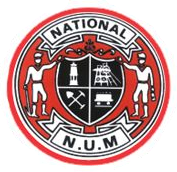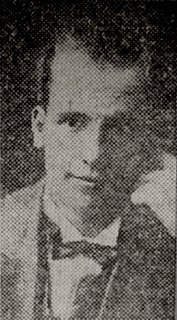The National Winding and General Engineers' Society was a trade union in the United Kingdom. It primarily represented stationary engineers employed at underground coal mines to operate the winding engines which ran the mining hoists. The operation of the mining hoist was a crucial part of the operation of a colliery and the engineers who ran them were generally more skilled than the general mineworkers, who were represented by the Miners' Federation of Great Britain (MFGB). The demarcation between engineers and miners often led to conflict between the two unions, as the MFGB aimed to be an industrial union, representing all employees in coal mining. [1] The engineers' union was affiliated to the Trades Union Congress. [2] It merged with the Transport and General Workers' Union in 1935. [3]

The National Union of Mineworkers (NUM) is a trade union for coal miners in Great Britain, formed in 1945 from the Miners' Federation of Great Britain (MFGB). The NUM took part in three national miners' strikes, in 1972, 1974 and 1984–85. After the 1984–85 strike and the subsequent closure of most of Britain's coal mines, it became a much smaller union. It had around 170,000 members when Arthur Scargill became leader in 1981, a figure which had fallen in 2015 to an active membership of around 100.
Black Friday, in British labour history, refers to 15 April 1921, when the leaders of transport and rail unions announced a decision not to call for strike action in support of the miners. The epithet 'black' derives from a widespread feeling amongst labour radicals that the decision amounted to a breach of solidarity and a betrayal of the miners.
The Miners' Federation of Great Britain (MFGB) was established after a meeting of local mining trade unions in Newport, Wales in 1888. The federation was formed to represent and co-ordinate the affairs of local and regional miners' unions in England, Scotland and Wales whose associations remained largely autonomous. At its peak, the federation represented nearly one million workers. It was reorganised into the National Union of Mineworkers in 1945.
The National Amalgamated Coal Workers' Union was a trade union in the United Kingdom which existed between 1889 and 1922. It represented coal porters and carmen.

The South Wales Miners' Federation (SWMF), nicknamed "The Fed", was a trade union for coal miners in South Wales. It survives as the South Wales Area of the National Union of Mineworkers.

The National Union of Scottish Mineworkers (NUSW) is a trade union in Scotland, founded in 1894 as the Scottish Miners Federation. It joined the Miners' Federation of Great Britain, and in 1914 changed its name to National Union of Scottish Mineworkers. It survives as the National Union of Mineworkers.

Joseph Jones was a British trade unionist.
The National Union of Blastfurnacemen, Ore Miners, Coke Workers and Kindred Trades (NUB) was a trade union in England and Wales which existed between 1888 and 1985. It represented process workers in the British iron and steel industry.
The Lancashire and Cheshire Miners' Federation (LCMF) was a trade union that operated on the Lancashire Coalfield in North West England from 1881 until it became the Lancashire area of the National Union of Mineworkers in 1945.

People have worked as coal miners for centuries, but they became increasingly important during the Industrial revolution when coal was burnt on a large scale to fuel stationary and locomotive engines and heat buildings. Owing to coal's strategic role as a primary fuel, coal miners have figured strongly in labour and political movements since that time. After the late 19th century coal miners in many countries were a frequent presence in industrial disputes with both the management and government. Coal miners' politics, while complex, have occasionally been radical, with a frequent leaning towards far-left political views. A number of far-left political movements have had the support of both coal miners themselves and their trade unions, particularly in Great Britain. In France, on the other hand, coal miners have been much more conservative.
The Lanarkshire Miners' County Union, later the Lanarkshire Mineworkers' Union, represented coal miners in the Lanarkshire district of Scotland.
The North Wales Miners' Association was a trade union representing coal miners in Wales.
The Fife and Kinross Miners' Association was a coal miners' trade union based in Fife and Kinross-shire in Scotland.

The Somerset Miners' Association or Somersetshire Miners' Association was a coal mining trade union based in the Somerset coalfield, Somerset, England.
The Cannock Chase Miners', Enginemen's and Surfacemen's Association was a trade union representing coal miners in the Cannock Chase area of England.
The North Staffordshire Miners' Federation was a trade union representing miners in the area of Stoke-on-Trent, located in Staffordshire, in England.
The National Federation of Colliery Enginemen and Boiler Firemen was a union federation in the United Kingdom. Its membership changed over time, but was centred on unions representing enginemen at coal mines.
This article is about the sponsorship of British Members of Parliament by mining trade unions.
The Cambrian Miners' Association, also known as the Rhondda District Miners' Association, was an early trade union representing coal miners in the Rhondda Valley, in Wales.
The Monmouthshire and South Wales Miners' Association was a trade union representing coal miners in south eastern Wales.
| This article related to a United Kingdom trade union is a stub. You can help Wikipedia by expanding it. |